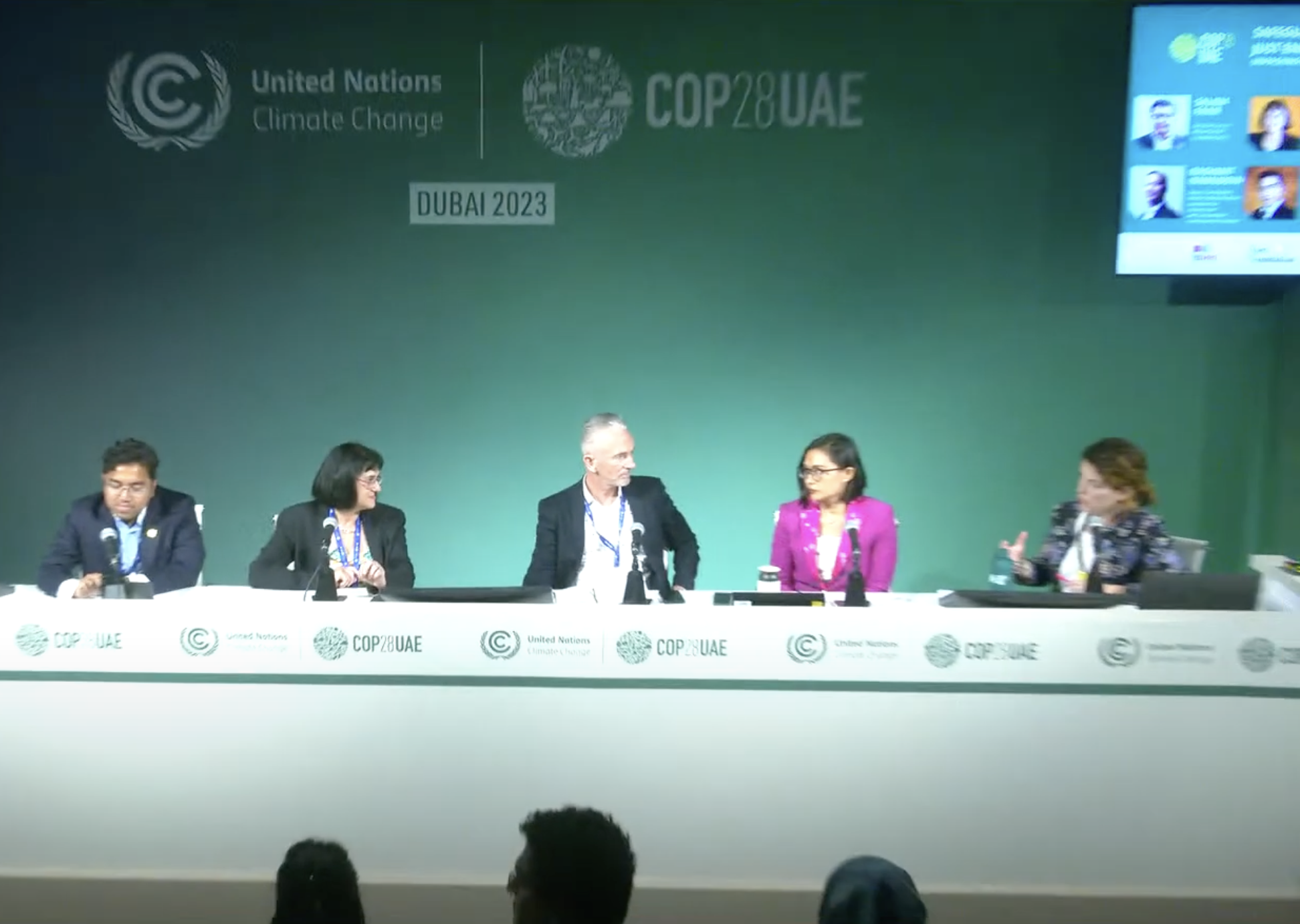A conversation with JETP Secretariats from Indonesia and South Africa and local civil society leaders to share lessons and progress on the “J” in JETPs.
Speakers
Opening Remarks:
- Rachmat Kaimuddin, Deputy Coordinating Minister of Maritime Affairs and Investments in Infrastructure and Transportation, Government of Indonesia
- Saliem Fakir, Executive Director, African Climate Foundation
Panel Discussion:
- Joanne Yawitch, Head of JETP Secretariat, South Africa
- Edo Mahendra, Head of JETP Secretariate, indonesia
- Dr Crispian Olver, Executive Director, Presidential Climate Commission (PCC) of South Africa
- Tiza Mafira, Director, Climate Policy Initiative (CPI)
- Haley St. Dennis, Head of Just Transitions Programme, Institute for Human Rights and Business (moderator)
Background
JETPs are an important first step in incentivising the much larger-scale private investment required for each country’s energy transition, continuously, over the next three decades. However, JETPs are also a new, untested, and so far ad-hoc model with enormous implications for the human rights of local workers, communities, indigenous groups, and consumers.
Depending on their transition contexts, countries embarking on these and other emerging climate finance models will have different approaches and challenges to delivering on their just transition commitments. However, successful models will be defined by a mixture of emission reductions, political settlement accords, and the attendant capacity to deal with a variety of justice claims.
There is currently a lack of internal and external coherence in the way various national policy makers across the JETP countries are interpreting the “just” dimensions of their national decarbonisation transitions – reflecting their own local tensions between decarbonisation, energy security, and economic development.
After two years of negotiation, consultation, and planning South Africa is on the verge of making its first disbursements of “just transition transactions”. Indonesia has just published its detailed investment plan for consultation. These moments are important markers in the standards each JETP sets in-country and as a model for others.
Key questions this session addresses:
- How has each country conceptualised just energy transition?
- How have they codified what counts as a just transition transaction and the “just” standards for the mix of public, private, and blended finance to be deployed?
- What is the role of the private sector in delivering decarbonisation in line with just transition principles?
- How do countries deal with issues of accountability and state capacity for implementation?
About the Co-Hosts
The African Climate Foundation (ACF): Established in 2020, ACF is the first African-led strategic grant-maker working at the nexus of climate change and development. We believe that change cannot be brought about by one party acting alone. We actively pursue, support and foster strong partnerships and platforms for collaboration. Through incremental sectoral, regional and national interventions, we adopt a two-track approach premised on high-level political and technical engagements while also building strong grassroots coalitions and movements. | www.africanclimatefoundation.org
Climate Policy Initiative (CPI): Climate Policy Initiative is an analysis and advisory organization with deep expertise in finance and policy. Our mission is to help governments, businesses, and financial institutions drive economic growth while addressing climate change. CPI has six offices around the world in Brazil, India, Indonesia, the United Kingdom, and the United States. | www.climatepolicyinitiative.org
Institute for Human Rights and Business (IHRB): IHRB’s mission is to make respect for people and planet part of everyday business in order to achieve a more just, regenerative global economy. We deploy a mix of human rights-based research, engagement, and collaborative action with businesses, governments, financial actors, and representatives of civil society in order to shape policy, advance practice, and strengthen accountability. We have developed a track record of independent analysis as well as constructive interventions and collaborative engagement with all constituencies, earning a reputation as a trusted organisation committed to working with all actors to identify practical solutions and approaches needed to effect positive change. | www.ihrb.org
The Ford Foundation: The Ford Foundation is an independent organization working to address inequality and build a future grounded in justice. For more than 85 years, it has supported visionaries on the frontlines of social change worldwide, guided by its mission to strengthen democratic values, reduce poverty and injustice, promote international cooperation, and advance human achievement. Today, with an endowment of $16 billion, the foundation has headquarters in New York and 10 regional offices across Africa, Asia, Latin America, and the Middle East. | www.fordfoundation.org
Laudes Foundation: Laudes Foundation is responding to the dual crises of inequality and climate change by supporting brave, innovative efforts that inspire and challenge industry to harness its power for good. Providing our partners with philanthropic capital, expertise and connections, we work collectively with and through specific industries to help catalyse systems change. At the same time, we work across sectors, influencing finance and capital markets to move towards a new economy that values all people and nature. Our strategy is designed to help accelerate the existing movement towards a climate positive and inclusive economy. | www.laudesfoundation.org





























The perception of ‘value’ needs to change if the World Bank’s mission is to succeed
Last week we attended the Spring Meetings of the World Bank and International Monetary Fund (IMF) in Washington, D.C. The annual IMF-World Bank meetings bring together finance ministers and central bankers from all regions as a platform for official...
26 April 2024 | Commentary
Commentary by Vasuki Shastry, Author, ESG/Strategic Communications Expert; International Advisory Council, IHRB Haley St. Dennis, Head of Just Transitions, IHRB